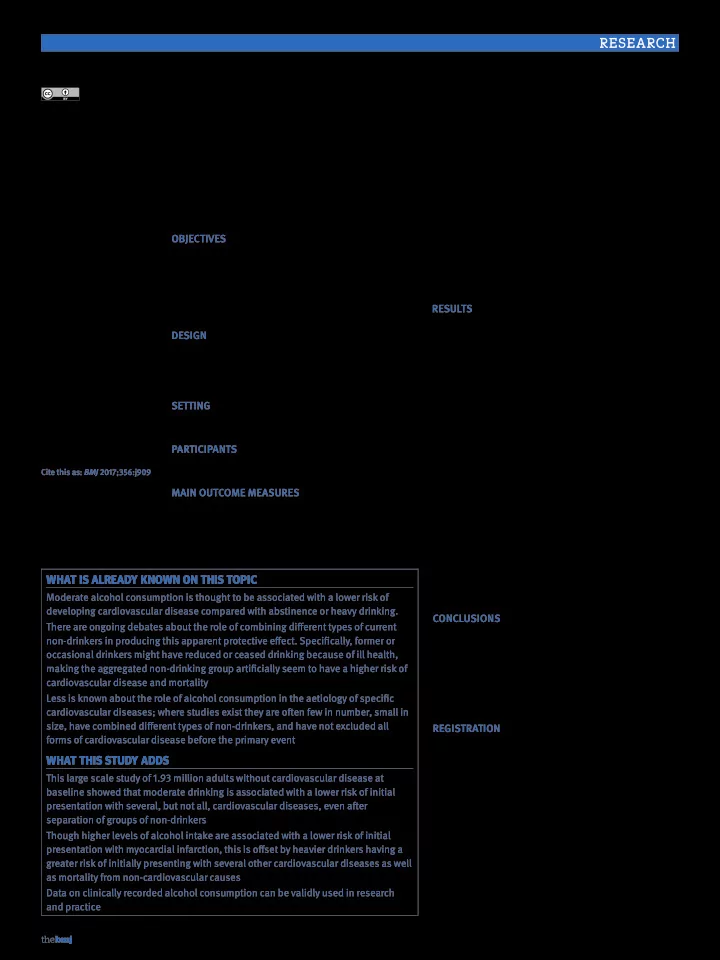

RESEARCH OPEN ACCESS Association between clinically recorded alcohol consumption and initial presentation of 12 cardiovascular diseases: population based cohort study using linked health records Steven Bell, 1,2 Marina Daskalopoulou, 3 Eleni Rapsomaniki, 4 Julie George, 4 Annie Britton, 2 Martin Bobak, 2 Juan P Casas, 4 Caroline E Dale, 4 Spiros Denaxas, 4 Anoop D Shah, 4 Harry Hemingway 4 ABSTRACT unheralded coronary heart disease death, heart 1 Department of Public Health and Primary Care, University of ObjeCtives failure, sudden coronary death/cardiac arrest, Cambridge, Strangeways To investigate the association between alcohol transient ischaemic attack, ischaemic stroke, Research Laboratory, consumption and cardiovascular disease at higher intracerebral and subarachnoid haemorrhage, Cambridge CB1 8RN, UK resolution by examining the initial lifetime peripheral arterial disease, and abdominal aortic 2 Research Department of presentation of 12 cardiac, cerebrovascular, aneurysm. Epidemiology and Public Health, University College abdominal, or peripheral vascular diseases among fjve results London, London WC1E 7HB, UK categories of consumption. 114 859 individuals received an incident cardiovascular 3 Department of Infection and Design diagnosis during follow-up. Non-drinking was Population Health, University College London, Royal Free Population based cohort study of linked electronic associated with an increased risk of unstable angina Hospital, London NW3 2PF, UK health records covering primary care, hospital (hazard ratio 1.33, 95% confjdence interval 1.21 to 4 Farr Institute of Health admissions, and mortality in 1997-2010 (median 1.45), myocardial infarction (1.32, 1.24 to1.41), Informatics Research (London), follow-up six years). unheralded coronary death (1.56, 1.38 to 1.76), heart University College London, London NW1 2DA, UK failure (1.24, 1.11 to 1.38), ischaemic stroke (1.12, 1.01 to setting Correspondence to : S Bell 1.24), peripheral arterial disease (1.22, 1.13 to 1.32), CALIBER (ClinicAl research using LInked Bespoke scb81@medschl.cam.ac.uk and abdominal aortic aneurysm (1.32, 1.17 to 1.49) studies and Electronic health Records). Additional material is published compared with moderate drinking (consumption online only. To view please visit PartiCiPants within contemporaneous UK weekly/daily guidelines the journal online. 1 937 360 adults (51% women), aged ≥ 30 who were free of 21/3 and 14/2 units for men and women, Cite this as: BMJ 2017;356:j909 from cardiovascular disease at baseline. respectively). Heavy drinking (exceeding guidelines) http://dx.doi.org/10.1136/bmj.j909 Main OutCOMe Measures conferred an increased risk of presenting with Accepted : 1 February 2017 12 common symptomatic manifestations of unheralded coronary death (1.21, 1.08 to 1.35), heart cardiovascular disease, including chronic stable failure (1.22, 1.08 to 1.37), cardiac arrest (1.50, 1.26 to angina, unstable angina, acute myocardial infarction, 1.77), transient ischaemic attack (1.11, 1.02 to 1.37), ischaemic stroke (1.33, 1.09 to 1.63), intracerebral haemorrhage (1.37, 1.16 to 1.62), and peripheral arterial disease (1.35; 1.23 to 1.48), but a lower risk of WHAT IS ALREADY KNOWN ON THIS TOPIC myocardial infarction (0.88, 0.79 to 1.00) or stable Moderate alcohol consumption is thought to be associated with a lower risk of angina (0.93, 0.86 to 1.00). developing cardiovascular disease compared with abstinence or heavy drinking. COnClusiOns There are ongoing debates about the role of combining difgerent types of current Heterogeneous associations exist between level of non-drinkers in producing this apparent protective efgect. Specifjcally, former or alcohol consumption and the initial presentation of occasional drinkers might have reduced or ceased drinking because of ill health, cardiovascular diseases. This has implications for making the aggregated non-drinking group artifjcially seem to have a higher risk of counselling patients, public health communication, cardiovascular disease and mortality and clinical research, suggesting a more nuanced Less is known about the role of alcohol consumption in the aetiology of specifjc approach to the role of alcohol in prevention of cardiovascular disease is necessary. cardiovascular diseases; where studies exist they are ofuen few in number, small in size, have combined difgerent types of non-drinkers, and have not excluded all registratiOn forms of cardiovascular disease before the primary event clinicaltrails.gov (NCT01864031). WHAT THIS STUDY ADDS Introduction This large scale study of 1.93 million adults without cardiovascular disease at The relation between alcohol consumption and cardio- baseline showed that moderate drinking is associated with a lower risk of initial vascular disease is both complex and controversial. 1 2 presentation with several, but not all, cardiovascular diseases, even afuer There have been multiple systematic reviews and separation of groups of non-drinkers meta-analyses of the association between consumption Though higher levels of alcohol intake are associated with a lower risk of initial and aggregated cardiovascular disease, 1-7 as well as presentation with myocardial infarction, this is ofgset by heavier drinkers having a cardiovascular traits. 1 8 9 Most have shown that, com- greater risk of initially presenting with several other cardiovascular diseases as well pared with non-drinking, moderate levels of alcohol as mortality from non-cardiovascular causes intake are associated with a lower risk of morbidity and Data on clinically recorded alcohol consumption can be validly used in research mortality from cardiovascular disease, as well as more and practice favourable cardiovascular health profjles in general. the bmj | BMJ 2017;356:j909 | doi: 10.1136/bmj.j909 1
Recommend
More recommend